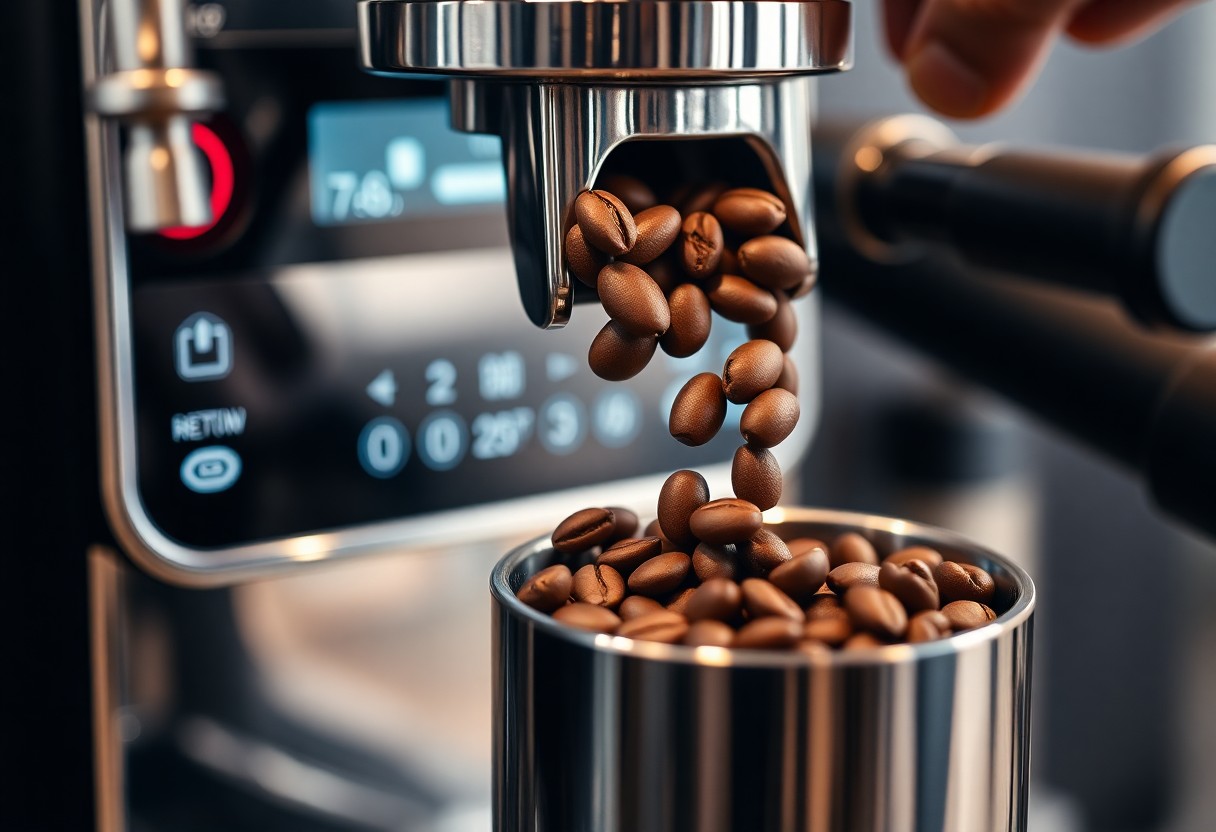Focus your mind as you examine into the surprising relationship between coffee and meditation. Many people find that caffeine can enhance their alertness and concentration, potentially leading to deeper meditation experiences. However, it’s important to recognize that while coffee can stimulate your brain, it may also introduce anxiety and disrupt your calm. In this post, you’ll explore how to balance your love for coffee with your meditation practice, ensuring that your focus brews elevate rather than hinder your mindfulness journey.
Key Takeaways:
- Coffee can enhance focus and concentration, potentially aiding in meditation practices by promoting a heightened state of awareness.
- The type of coffee and its caffeine content can influence individual experiences with meditation; lighter roasts may provide better mental clarity than darker options.
- Mindful consumption of coffee, such as savoring its aroma and taste, can itself serve as a meditative practice, enhancing the overall meditation experience.

The Chemistry of Coffee: Neurotransmitters at Play
Coffee is more than just a delightful morning ritual; it’s a complex blend of chemicals that can significantly impact your brain. At the heart of coffee’s effects are its ability to modulate neurotransmitters like dopamine and norepinephrine, which play crucial roles in mood regulation and attentiveness. Caffeine, the most notorious component, enhances the release of these neurotransmitters, leading to improved cognitive function and a sense of well-being. Understanding this chemistry opens doors to enhancing your meditation practices through the judicious use of coffee.
How Caffeine Influences Brain Function
Caffeine primarily works by blocking adenosine receptors in your brain, which increases the release of dopamine. This enhancement can boost your mood and improve your ability to concentrate, making it easier for you to focus during meditation. Studies show that a moderate intake of caffeine can lead to sharper thinking and heightened alertness, directly contributing to an improved meditation experience.
The Balance of Alertness and Relaxation
Finding the sweet spot between alertness and relaxation while meditating can be challenging. Coffee aids this balance by providing the stimulation you need to stay awake while calming your mind through the very act of sipping a warm drink. Many practitioners report that when consumed in moderation, caffeine brings a clarity that complements their meditation, allowing deeper introspection without overwhelming their senses.
This balance is often a matter of trial and error. Some people thrive on a single cup, enhancing their meditative state without feeling jittery, while others may require lower doses or even alternatives to find comfort in their practice. The key lies in understanding your body’s unique response to coffee; too much caffeine could lead to anxiety, which conflicts with the goals of meditation. Experimenting with different brewing methods or blends may help you discover a formulation that helps achieve the optimal state for your mind during those reflective moments.
Meditation Dynamics: The Role of Focus
Your ability to focus directly influences the depth and efficacy of your meditation practice. Concentration acts as a bridge to deeper states of awareness, promoting mindfulness and enabling you to connect with your thoughts on a more profound level. Achieving mental clarity allows you to enter a state of flow, where distractions fade away, and you can truly engage with the present moment. This dynamic interplay between focus and meditation can open the door to enhanced self-awareness and personal growth.
The Science of Attention and Mindfulness
Attention, a key component of mindfulness, relies on various cognitive processes that involve the brain’s ability to filter information and prioritize stimuli. Research shows that your prefrontal cortex, which governs attention, plays a significant role in modulating your meditation experience. The *anterior cingulate cortex* and *insular cortex* also contribute by integrating emotional and sensory information, helping you maintain focus even amidst distractions. This synergy between various brain regions creates a comprehensive foundation for cultivating mindfulness.
How Emotions Interact with Focus in Meditation
Your emotional state can profoundly influence your focus during meditation. Positive emotions, such as gratitude or joy, typically enhance your ability to concentrate, allowing for a richer meditation experience. Conversely, negative emotions, like anxiety or anger, may create mental clutter, hindering clarity and focus. Understanding this dynamic can empower you to navigate your emotional landscape as you meditate, leading to more effective practice.
When you meditate, emotions serve as both allies and adversaries in your quest for focus. If you encounter feelings of frustration or stress, recognizing and acknowledging them can transform the meditation experience. Techniques like compassion meditation or focused breathing might help alleviate negative emotions, enabling you to regain focus. Engaging with your emotions, rather than suppressing them, can lead to greater insights and a more comprehensive understanding of your mental state during meditation, ultimately enriching your practice.
The Intersection of Coffee and Meditation: A Personal Perspective
The relationship between coffee and meditation is deeply personal, often varying from one individual to another. For some, the slight caffeine boost can create a perfect synergy with meditation, promoting a state of heightened awareness and clarity. You might find your mind more engaged, allowing for deeper contemplation during your practice. Conversely, others may experience jitters or distractions, undermining their meditative focus. Understanding your unique response to coffee can help you navigate this intersection to cultivate an enriching meditation experience.
Anecdotal Evidence: User Experiences
Many individuals report that incorporating coffee into their meditation routine enhances their sessions. You may find stories of practitioners who sip their morning brew before meditating, describing a noticeable increase in alertness and presence. These anecdotal experiences often highlight personal transformations, as users become more connected with their mindfulness practices after enjoying a cup of coffee. However, it’s imperative to consider your own relationship with coffee to determine if it acts as a facilitator or a distraction.
Cultural Context: Coffee in Traditional Meditation Practices
In various traditions, coffee holds a longstanding relationship with meditation and mindfulness practices. For instance, in Ethiopia, the coffee ceremony serves not only as a social event but also as a meditative act. Participants gather around, savoring the moment and engaging in conversation, fostering an environment conducive to reflection and connection. Similarly, in certain Zen practices, monks have employed tea and other beverages to enhance mindfulness, emphasizing slow, purposeful consumption as a meditative ritual.
Brew Techniques for Enhanced Mindfulness
Finding the right brew technique can significantly enhance your meditation experience, promoting a state of calm and focus. Techniques that encourage you to engage with the coffee preparation process can elevate your mindfulness, turning your coffee ritual into a meditative practice itself. From selecting quality beans to the precision of your brewing method, every detail helps foster a deeper connection with your sensory experiences. Focus on the aroma, texture, and flavor, transforming your coffee time into an exercise in observation and presence.
Recommended Coffee Varieties for Meditation
Opt for beans with lower acidity and smooth flavor profiles, such as Colombian or Sumatran coffees. These varieties tend to have a balanced taste that supports a relaxed atmosphere rather than overwhelming your senses. Additionally, considering organic or ethically sourced options can enhance your engagement with your brew, as the conscious choice aligns with mindfulness practices. A medium roast captures the essence of the beans without excessive bitterness, offering a harmonious sip ideal for your meditation sessions.
Brewing Methods that Promote Calm Focus
Pour-over and French press are popular brewing methods that inherently encourage mindfulness. These techniques require a slower pace and more attention, fostering a deeper connection with your coffee. With the pour-over, the gentle pouring of water over coffee grounds invites you to focus on the process, while the French press allows you to engage with the texture and aroma fully. Experimenting with temperature and brew time can lead you to discover the perfect cup that enhances your meditation, giving your mind a serene space to settle and center.
As you navigate these brewing methods, mindfulness naturally emerges. The pour-over technique, for instance, encourages you to pour water in a circular motion, retaining focus and inviting a rhythmic calmness. On the other hand, the French press not only allows for an immersive experience as you wait for the coffee to steep but also enhances tactile engagement as you push down the plunger. These steps transform coffee preparation into an almost ritualistic practice, enabling you to live in the moment and prepare your mind for meditation.

Potential Pitfalls: When Coffee Hinders Meditation
While coffee can elevate focus during meditation, it can also introduce some challenges that may hinder your practice. The right balance is key; without it, the very brew meant to enhance your mindfulness might lead to distractions instead. It’s vital to recognize the moments when your cup could be working against you, disrupting your peaceful state rather than supporting it.
The Risks of Overconsumption
Drinking coffee in excess can lead to heightened levels of anxiety and restlessness, which are counterproductive to meditation. Studies show that consuming over 400 mg of caffeine daily can trigger jitters, rendering you unable to achieve a calm, centered mindset. This excess can detract from the meditative benefits you seek and overshadow the potential positive effects.
Signs Your Coffee Might be Distracting Rather than Enhancing
If you suddenly find yourself racing thoughts or an inability to settle into silence, your coffee intake may be impacting your practice. Noticeable signs include increased heart rate, erratic breathing patterns, or a sense of agitation. These symptoms indicate that rather than grounding you, the caffeine is pushing you towards a state of distraction.
Frequent mental distractions during meditation can signal that coffee consumption is tipping the scales. If you sense your mind bombarding you with thoughts of to-do lists or if your body feels restless, it’s time to assess your brewing habits. You might be clutching a cup that leaves you feeling over-caffeinated and scattered, rather than centered. Paying attention to your body’s reactions to caffeine during meditation is necessary—it’s about moderation and finding what truly allows you to engage deeply with your practice.
To wrap up
Summing up, coffee can be an effective ally in enhancing your meditation practice by promoting focus and mental clarity. By carefully selecting varieties that suit your personal taste and brewing methods that resonate with you, you can create a soothing ritual that complements your meditation sessions. Experiment with timing and quantities to discover the right balance that helps engage your mind without overwhelming it. Ultimately, the synergy between coffee and meditation may foster a deeper connection to your practice, allowing you to cultivate a more profound sense of awareness and tranquility.
FAQ
Q: How can coffee impact my ability to meditate?
A: Coffee contains caffeine, which is a stimulant that can enhance alertness and concentration. For many people, this increased focus might lead to a clearer mind during meditation. However, it is imperative to understand that caffeine can also lead to jitteriness and anxiety in some individuals, which might impede the calming process of meditation. It is advisable to find a balance that works for your body and mental state.
Q: Is it better to drink coffee before or after meditation?
A: The timing of coffee consumption can vary from person to person. Some might prefer to have a cup before meditation to enhance their focus, while others might find it more effective to meditate first and then enjoy coffee afterward as a way to sustain that clarity. Experimenting with both approaches can help you determine what feels best for your meditation practice.
Q: What types of coffee are best for meditation?
A: When choosing coffee for meditation, consider lighter roasts, which tend to have higher caffeine content and milder acidity, making them easier on the stomach. Additionally, organic coffee varieties can be appealing as they are often free from harmful pesticides and chemicals that may distract you during meditation. Ultimately, the best type of coffee will be one that you enjoy and that aligns with your personal preferences.
Q: Can decaffeinated coffee still help with focus during meditation?
A: Yes, decaffeinated coffee can still provide some benefits. Although it has significantly less caffeine, the ritual of sipping a warm beverage can create a sense of comfort and calm, enhancing your meditation experience. Moreover, the act of engaging in a mindful coffee routine may help set the mood for your meditation practice, encouraging relaxation and focus.
Q: Are there any negative effects of drinking coffee before meditation?
A: While coffee can enhance focus, it may also lead to increased heart rate, anxiety, or restlessness in some individuals. These effects can disrupt the peace sought in meditation. Moreover, consuming coffee too close to your meditation session may lead to a caffeine crash later on. It’s imperative to listen to your body and consider how coffee affects your personal meditation practice. If it feels disruptive, you might explore alternative beverages or adjust the timing of your coffee consumption.
